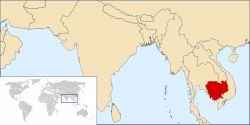UN Security Council Resolution 668
|
UN Security
Council Resolution 668 |
|
|---|---|
| Date: | 20th September 1990 |
| Meeting: | 2941 |
| Identifier: | S / RES / 668 ( document ) |
|
|
|
| Poll: | Pro: 15 Ent. : 0 Cons: 0 |
| Object: | Cambodia |
| Result: | Accepted |
|
|
|
| Composition of the Security Council 1990: | |
| Permanent members: | |
| Non-permanent members: | |
|
|
|
|
|
|
|
|
|

|
|
| Location of Cambodia | |
The UN Security Council Resolution 668 is a resolution that the United Nations Security Council at its 2941st meeting on 20 September 1990 unanimously decided. After taking note of the ongoing political discussions and efforts to bring about a just and lasting peaceful situation in Cambodia , the Council approved the political framework that would allow the Cambodian people to exercise their right to self-determination through United Nations- organized elections.
The council had been dealing with the issue of Cambodia and the occupation of the country by Vietnamese troops for nearly a decade , but the council was unable to act due to a lack of consensus among its permanent members. Instead, it was dealt with by the General Assembly . After the fall of the Khmer Rouge in 1979 , Vietnam installed a puppet government that was opposed by several groups in the country, including the United National Front for an Independent, Neutral, Peaceful and Cooperative Cambodia , the Khmer People's Liberation Front and the Party of Democratic Cambodia , but was supported by both Vietnam and the Soviet Union . Representatives from all parties gathered for the Paris Conference in 1989, but no agreement was reached.
After the revolution in 1989, the Sino- Vietnamese Chengdu conference of September 1990 favored the dialogue with 13 members proposed by Beijing instead of the dialogue solution with 12 members proposed by Hanoi. After talks in Indonesia and Japan in October 1990, the parties agreed on a plan in which they would be guided by certain principles in order to solve the Cambodian problem. The Security Council recognized and welcomed the agreement in Resolution 668.
The resolution welcomes the creation of a Supreme National Council as a source of authority during the transition period. He also asked other countries and the Secretary General to continue to participate in the peace settlement. A move in the General Assembly in support of the peace process was also approved in resolution 45/3 of October 15, 1990.
See also
Web links
Individual evidence
- ^ A b United Nations Advance Mission in Cambodia - Background. United Nations, accessed March 6, 2019 .
- ↑ Stephen R. Heder, Judy Ledgerwood: Propaganda, Politics, and Violence in Cambodia: Democratic Transition under United Nations Peace-keeping . ME Sharpe, 1996, ISBN 978-1-56324-665-4 , pp. 243 .
